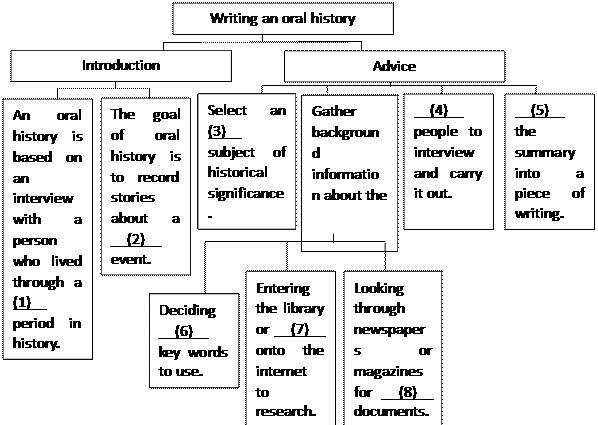问题
完形填空
An oral history is a piece of writing based on an interview with a person who has lived through a significant period in history or experienced a historical event. His or her memories provide a personal view of the past. The first goal of all oral histories is to record stories about a specific subject. That subject may be a historical event like the D-Day invasion. It may be a period of history like the Depression, or a social or cultural trend, such as child labor. The first step in an oral history project, therefore, is to select a subject that interests you and is of historical significance. Before attempting to identify people to interview for your project, you must first gather background information about the subject. The Library of Congress, which houses thousands of oral histories, provides these tips for researching your subject. Before entering the library or logging onto the internet, decide on key words to use in your search. Use detailed search words. For example, search for rock and roll of the ’60s instead of the more general term music. Look through newspaper and magazine articles and Internet Web sites to identify documents that are related to your subject. Make copies of those that will help you plan your interview questions and discard all others. Discuss what you’ve read about your subject surprised you? What aspect of your subject would you like to know more about? Asking questions like these will help you to focus your subject and to identify the voice or voices you need to interview. Oral histories are as much about self as they are about subject. One goal of an oral history interview is to find out what happened. A second and equally important goal is to discover how people reacted to or were affected by what happened. The person you select to interview, therefore, should have had some experience with the subject – either as a participant or a witness. Once you have identified one or more people to interview, begin preparing your questions. The best questions are open-ended, encouraging the speaker to respond with more than a mere “Yes” or “No.” For example, an interviewer might have asked Clarence Hughart this question about his D-Day experience: Were you scared? That question, however, would probably not have elicited the sort of dramatic storytelling that Hughart provided. Make a list of ten possible interview questions. The first two or three should be fairly general, asking the interviewee to talk about his or her childhood, perhaps. These kinds of questions put people at ease. Save more sensitive questions until the interview has been underway for five, 10, or 15 minutes or more. After the interview come the final steps: writing a summary of the interview and then shaping it into a finished piece of writing.
| |||||||||||||||||||||||||||||||||||||||||||||||||||||
答案
1. significant 2. historical 3.interesting 4. Identify
5. Shape 6. on/what 7. log 8. related/relevant
9. witness 10. Starting/Beginning


